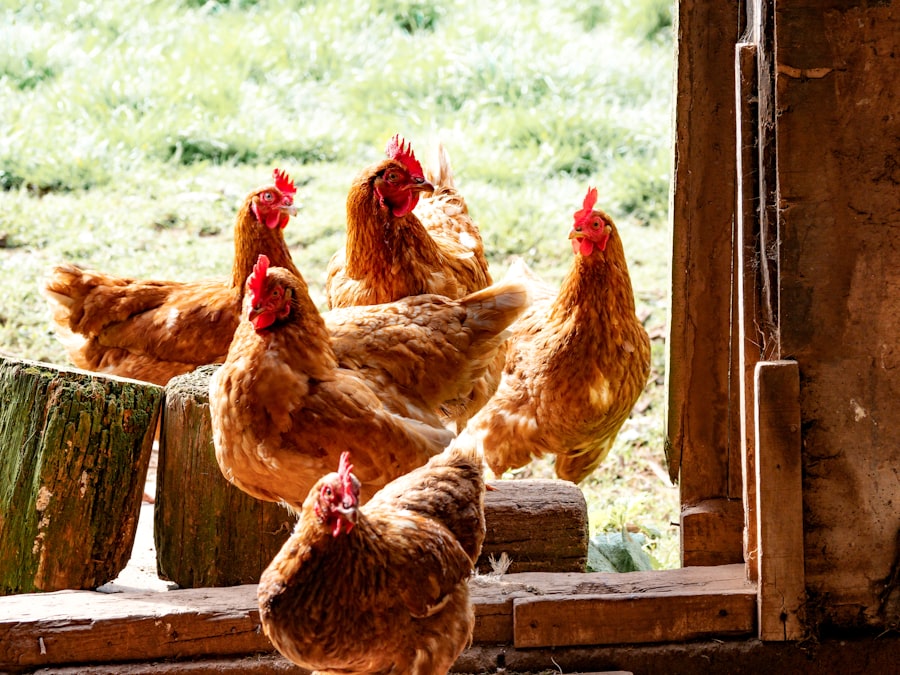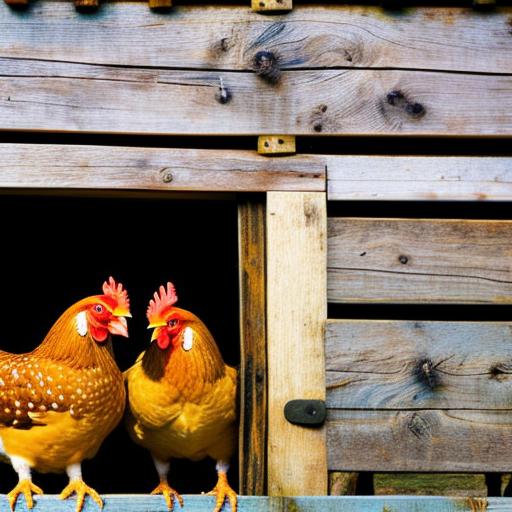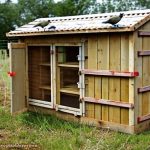Keeping chickens in a shed is a popular alternative to building a traditional coop. It offers several benefits, such as protection from predators and weather, as well as being a more affordable option. In this article, we will explore the advantages of keeping chickens in a shed, how to choose the right shed, and how to prepare it for your feathered friends. We will also discuss the benefits of building a chicken coop inside the shed, designing the coop for maximum comfort and safety, choosing the right materials, and maintaining a clean and safe environment for your chickens. Lastly, we will provide tips for raising happy and healthy chickens in a shed.
Key Takeaways
- Keeping chickens in a shed is possible and has many benefits.
- Choosing the right shed and preparing it properly is crucial for the health and safety of your chickens.
- Building a chicken coop inside the shed requires careful planning and consideration of the chickens’ needs.
- Choosing the right materials for the coop and maintaining it regularly is important for the chickens’ well-being.
- Raising happy and healthy chickens in a shed requires attention to their diet, environment, and social needs.
Benefits of Keeping Chickens in a Shed
One of the main benefits of keeping chickens in a shed is the protection it provides from predators and harsh weather conditions. A shed offers a secure and enclosed space where your chickens can roam freely without the risk of being attacked by predators such as foxes or raccoons. Additionally, a shed provides shelter from extreme temperatures, strong winds, and heavy rain, ensuring that your chickens stay safe and comfortable throughout the year.
Another advantage of keeping chickens in a shed is that it can be a more affordable option compared to building a traditional coop. If you already have an unused shed on your property, you can easily convert it into a chicken coop with minimal expenses. This can save you money on materials and construction costs that would be required to build a new coop from scratch. By repurposing an existing structure, you can create a suitable living space for your chickens without breaking the bank.
Choosing the Right Shed for Your Chickens
When choosing a shed for your chickens, there are several factors to consider. First and foremost, you need to ensure that the shed is large enough to accommodate your flock comfortably. Chickens require adequate space to move around, stretch their wings, and engage in natural behaviors. As a general rule of thumb, allow at least 4 square feet of space per chicken inside the shed.
Ventilation is another crucial factor to consider when choosing a shed for your chickens. Good airflow is essential to prevent the buildup of ammonia and moisture, which can lead to respiratory issues and other health problems for your chickens. Look for a shed with windows or vents that can be opened and closed as needed to regulate the airflow.
In addition to size and ventilation, it is important to choose a shed that is easy to clean and maintain. Look for sheds with smooth surfaces that can be easily wiped down and disinfected. Avoid sheds with rough or porous materials that can harbor bacteria and parasites. Consider the accessibility of the shed as well, ensuring that you can easily reach all areas for cleaning and maintenance purposes.
Preparing the Shed for Your Chickens
Before introducing your chickens to the shed, it is important to take a few steps to prepare the space for them. Start by thoroughly cleaning the shed, removing any debris or dirt that may be present. This will help create a clean and sanitary environment for your chickens.
Insulation is another important consideration when preparing the shed for your chickens. Insulating the shed will help regulate the temperature inside, keeping it warm in winter and cool in summer. This is especially important if you live in an area with extreme weather conditions. Insulation can be added to the walls, ceiling, and floor of the shed using materials such as foam boards or fiberglass insulation.
Lighting and ventilation are also crucial aspects to consider when preparing the shed for your chickens. Natural light is important for their overall health and well-being, so make sure there are windows or skylights in the shed to allow sunlight to enter. Additionally, provide artificial lighting if necessary to ensure that your chickens have enough light during darker months.
Proper ventilation is essential to maintain good air quality inside the shed. Install vents or windows that can be opened and closed as needed to allow fresh air to circulate. This will help prevent the buildup of ammonia and moisture, which can lead to respiratory issues and other health problems for your chickens.
Building a Chicken Coop Inside the Shed
Building a chicken coop inside the shed is a great way to provide a safe and comfortable space for your chickens. A coop will give them a designated area to roost, lay eggs, and seek shelter. There are different types of coops you can build, depending on your preferences and the needs of your flock.
A traditional coop is a popular choice for many chicken keepers. It typically consists of nesting boxes, perches, and a roosting area. The nesting boxes provide a private space for your hens to lay their eggs, while the perches and roosting area give them a place to sleep at night. Make sure to provide enough nesting boxes and perches to accommodate all of your chickens comfortably.
Another option is to build a roosting bar inside the shed. This is a simple and cost-effective solution that allows your chickens to perch and roost off the ground. A roosting bar can be installed at various heights, providing multiple levels for your chickens to choose from.
Chicken Coop Plan: Designing Your Coop for Maximum Comfort and Safety

When designing your chicken coop, there are several factors to consider to ensure maximum comfort and safety for your flock. First, determine the size of the coop based on the number of chickens you have or plan to have. As mentioned earlier, allow at least 4 square feet of space per chicken inside the coop.
The layout of the coop is also important. Consider placing the nesting boxes in a quiet and secluded area where your hens can lay their eggs undisturbed. Provide enough nesting boxes so that each hen has her own space. Place the perches and roosting area higher up in the coop, away from the nesting boxes, to encourage your chickens to sleep there at night.
Nesting boxes should be filled with clean and soft bedding material, such as straw or wood shavings. This will provide a comfortable and cozy space for your hens to lay their eggs. Make sure to regularly clean and replace the bedding to maintain good hygiene in the coop.
Perches should be placed at a height that allows your chickens to comfortably roost and sleep. Provide enough perching space so that each chicken has her own spot. The perches should be made of smooth and sturdy materials, such as wooden dowels or PVC pipes, to prevent injuries.
Choosing the Right Materials for Your Chicken Coop
When building a chicken coop inside a shed, you have several options for materials. Wood is a popular choice due to its durability and natural insulation properties. It provides good protection against the elements and can be easily customized to fit your specific needs. However, keep in mind that wood requires regular maintenance, such as sealing or painting, to prevent rotting or warping.
PVC is another material that can be used to build a chicken coop inside a shed. It is lightweight, easy to clean, and resistant to moisture and pests. PVC coops are also relatively inexpensive compared to wooden ones. However, they may not provide the same level of insulation as wood, so additional measures may need to be taken to regulate the temperature inside the coop.
Wire mesh is an essential material for the walls and windows of your chicken coop. It provides ventilation while keeping predators out. Make sure to choose a sturdy and durable wire mesh that can withstand the pecking and scratching of your chickens.
Maintaining Your Chicken Coop: Keeping it Clean and Safe
Maintaining a clean and safe chicken coop is crucial for the health and well-being of your flock. Regular cleaning and disinfecting will help prevent the spread of disease and parasites. Remove any soiled bedding, droppings, or uneaten food from the coop on a daily basis. Replace the bedding as needed to keep the coop clean and odor-free.
Disinfect the coop periodically using a poultry-safe disinfectant. This will help kill any bacteria or parasites that may be present. Make sure to follow the instructions on the disinfectant product and allow sufficient time for the coop to dry before reintroducing your chickens.
Inspect the coop regularly for any signs of damage or wear. Repair or replace any broken or damaged parts to ensure the safety of your chickens. Check for any gaps or holes that may allow predators to enter and secure them accordingly.
Tips for Raising Happy and Healthy Chickens in a Shed
To raise happy and healthy chickens in a shed, there are several tips to keep in mind. First and foremost, provide your chickens with fresh water and food on a daily basis. Make sure they have access to clean water at all times, and offer a balanced diet that includes a mix of grains, vegetables, and protein.
Provide enough space for your chickens to move around and engage in natural behaviors. Overcrowding can lead to stress, aggression, and health problems. Allow at least 10 square feet of outdoor space per chicken if possible, or provide an outdoor run where they can stretch their wings.
Socialization is also important for your chickens’ well-being. Chickens are social animals that thrive in the company of others. If possible, keep at least three chickens together to prevent loneliness and boredom. Introduce new chickens gradually to avoid conflicts within the flock.
Is Keeping Chickens in a Shed Right for You?
Keeping chickens in a shed offers several benefits, such as protection from predators and weather, as well as being a more affordable option compared to building a traditional coop. By choosing the right shed, preparing it properly, and building a chicken coop inside, you can create a safe and comfortable living space for your chickens. Remember to choose the right materials, maintain a clean and safe environment, and provide your chickens with enough space and socialization. If you are considering keeping chickens in a shed, take the time to research and plan accordingly. With the right knowledge and preparation, you can enjoy the rewards of raising happy and healthy chickens in your own backyard.
If you’re wondering about keeping chickens in a shed, you may also be interested in learning about how long it takes for chicken eggs to hatch naturally. Understanding the incubation process is crucial for successful breeding. Poultry Wizard has a helpful article that provides insights into this topic. Check out their article on “How Long for Chicken Eggs to Hatch Naturally” to gain a deeper understanding of the incubation period and what factors can affect it. Click here to read more about it.
FAQs
What are the basic requirements for keeping chickens in a shed?
To keep chickens in a shed, you need to ensure that the shed is well-ventilated, has enough space for the chickens to move around, and is equipped with nesting boxes, perches, and a feeding area. You also need to provide them with access to fresh water and food.
Is it legal to keep chickens in a shed?
The legality of keeping chickens in a shed varies depending on your location. Some cities and towns have specific regulations regarding the keeping of chickens, while others do not. It is important to check with your local authorities before keeping chickens in a shed.
What are the benefits of keeping chickens in a shed?
Keeping chickens in a shed can provide a number of benefits, including a source of fresh eggs, natural pest control, and fertilizer for your garden. Chickens can also be entertaining and enjoyable pets.
What are the potential drawbacks of keeping chickens in a shed?
Keeping chickens in a shed can also have some potential drawbacks, such as the risk of disease and pests, the need for regular cleaning and maintenance, and the potential for noise and odor.
What should I consider before keeping chickens in a shed?
Before keeping chickens in a shed, you should consider factors such as the size and ventilation of the shed, the number of chickens you plan to keep, and the amount of time and effort you are willing to devote to their care. You should also consider the potential impact on your neighbors and any local regulations that may apply.
Meet Walter, the feathered-friend fanatic of Florida! Nestled in the sunshine state, Walter struts through life with his feathered companions, clucking his way to happiness. With a coop that’s fancier than a five-star hotel, he’s the Don Juan of the chicken world. When he’s not teaching his hens to do the cha-cha, you’ll find him in a heated debate with his prized rooster, Sir Clucks-a-Lot. Walter’s poultry passion is no yolk; he’s the sunny-side-up guy you never knew you needed in your flock of friends!







